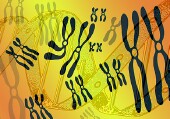But it won’t eliminate need for invasive diagnostics such as amniocentesis
THURSDAY, April 2, 2015 (HealthDay News) — A DNA-based blood test appears to be more effective in detecting possible Down syndrome in unborn children than other screening methods, researchers say. The findings have been published in the April 2 issue of the New England Journal of Medicine.
The test exhibited perfect accuracy in a clinical trial, detecting Down syndrome in all 38 women whose children had the condition. By comparison, standard screening methods only detected Down syndrome in 30 of the 38 expecting mothers, the study authors said. In the test, clinicians analyze fetal DNA (also called cell-free DNA) circulating freely in a pregnant woman’s bloodstream. The new clinical trial compared the cell-free DNA screening test to standard first-trimester screening (with measurement of nuchal translucency and biochemical analytes).
Earlier studies of cell-free DNA screening focused on older women believed to be at higher risk for birth defects, but this trial followed 15,841 women with an average age of 31. One-quarter were over 35, the age at which women traditionally have been considered high risk.
Besides its strong accuracy, the cell-free DNA test also had a much lower false-positive rate than standard screening — 0.06 percent, versus 5.4 percent with standard screening, the study authors said. However, despite its accuracy, mothers should follow up any positive result with an invasive diagnostic test such as amniocentesis before making any decisions regarding their pregnancy, Joe Leigh Simpson, M.D., senior vice president of research and global programs at the March of Dimes in White Plains, N.Y., told HealthDay. “This [new test] is a major advance, but you’re still going to have to confirm the results,” he said.
The clinical trial was funded in part by Ariosa Diagnostics, manufacturer of a cell-free DNA prenatal screen.
Copyright © 2015 HealthDay. All rights reserved.








